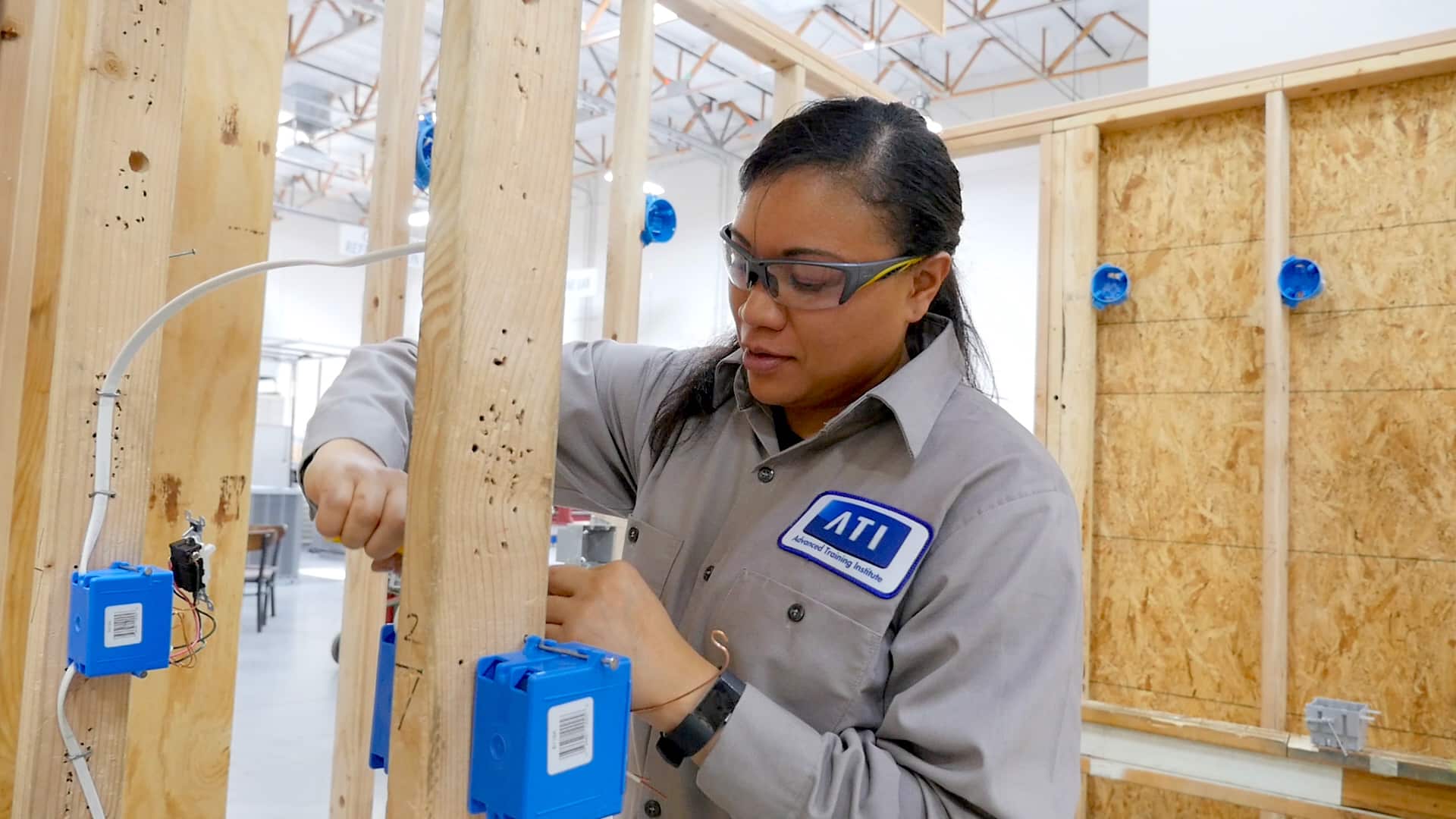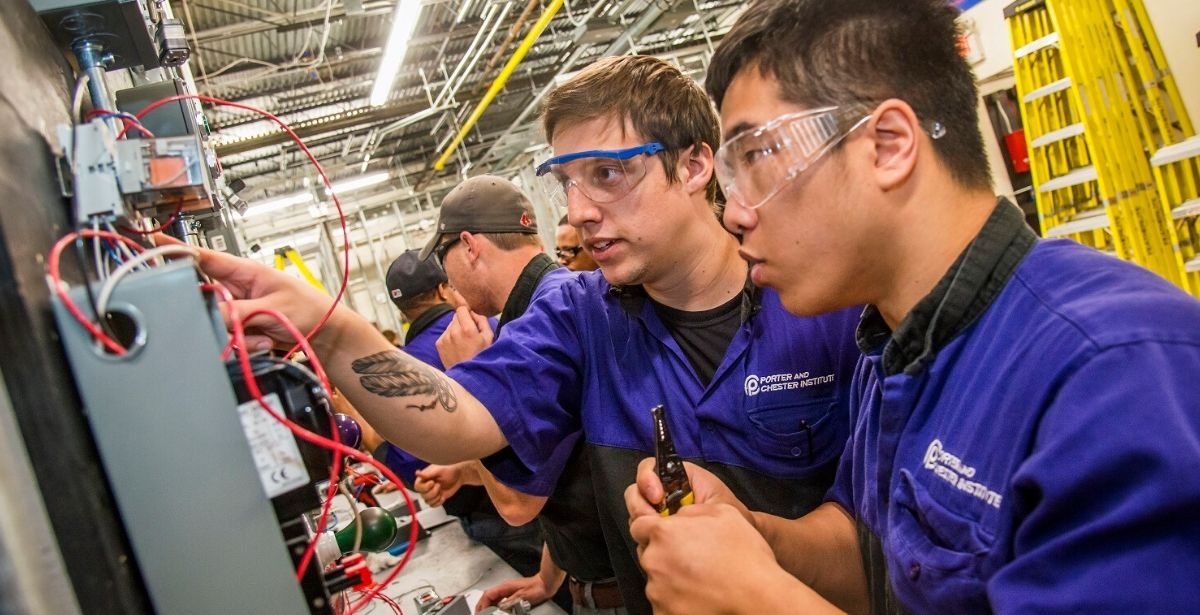Electrician training involves learning electrical systems, safety protocols, and hands-on skills. It prepares individuals for a career as a licensed electrician.
Electrician training is essential for anyone aspiring to become a professional in the electrical field. It encompasses both theoretical knowledge and practical skills. Trainees learn about electrical circuits, wiring, and safety regulations. Programs often include classroom instruction and apprenticeships for real-world experience.
This dual approach ensures that trainees are well-prepared for the challenges of the job. Electrician training also covers the use of various tools and equipment, troubleshooting techniques, and compliance with industry standards. By completing a comprehensive training program, individuals can secure better job opportunities and career advancement in the electrical industry.
Introduction To Electrician Training
Electrician training is essential for anyone who wants to become a skilled electrician. This training provides the knowledge and skills needed to work with electrical systems safely and effectively. It covers various aspects, from basic electrical principles to advanced troubleshooting techniques. Aspiring electricians must undergo rigorous training to ensure they can handle the complexities of modern electrical systems.
Importance Of Skilled Electricians
Skilled electricians are vital for ensuring the safety and functionality of electrical systems. They help prevent electrical fires, which can cause significant damage and loss of life. Electricians also ensure that electrical systems in homes and businesses run efficiently. This reduces energy costs and minimizes environmental impact.
Without skilled electricians, our modern way of life would be impossible. They install and maintain the electrical infrastructure that powers our homes, schools, and workplaces. Their expertise keeps the lights on and the machinery running, making skilled electricians indispensable in today’s world.
Overview Of The Training Process
The training process for electricians involves several steps. First, aspiring electricians must complete a high school diploma or equivalent. This provides the basic education needed for further training.
Next, they enroll in a technical school or community college program. These programs offer courses in electrical theory, circuitry, and safety practices. Students also learn about the National Electrical Code (NEC), which governs electrical work in the United States.
After completing their formal education, aspiring electricians must gain hands-on experience. This is typically done through an apprenticeship program. Apprentices work under the supervision of experienced electricians. They learn practical skills, such as installing wiring, troubleshooting electrical issues, and reading blueprints.
Apprenticeships usually last four to five years. During this time, apprentices earn a wage while gaining valuable experience. After completing their apprenticeship, electricians must pass a licensing exam. This exam tests their knowledge of electrical theory and practical skills.
Once licensed, electricians can work independently or for electrical contractors. They must continue their education throughout their careers to stay current with new technologies and regulations.
Essential Skills For Electricians
Electricians need a specific set of skills to perform their job well. These skills ensure they can handle any situation safely and effectively. In this section, we’ll discuss the essential skills every electrician should have.
Technical Skills
Electricians must have a solid grasp of technical knowledge. They need to understand wiring diagrams, schematics, and blueprints. These documents are essential for setting up electrical systems.
Here’s a list of crucial technical skills:
- Reading and interpreting blueprints
- Installing and repairing wiring
- Understanding electrical codes and standards
- Using testing devices like voltmeters and ammeters
Electricians also need to be proficient with various tools. They use screwdrivers, pliers, wire strippers, and multimeters daily. Mastery of these tools is crucial for quality work.
Safety Practices
Safety is a top priority for electricians. They face many risks, including electric shocks and burns. Following strict safety practices can prevent these dangers.
Key safety practices include:
- Wearing protective gear like gloves and goggles
- Using insulated tools
- Following lockout/tagout procedures
- Keeping work areas clean and organized
Electricians must also stay updated on safety regulations. They should know the latest guidelines from organizations like OSHA.
Proper safety training can save lives. Electricians should always prioritize safety in every task.
Educational Pathways
Electricians play a crucial role in building and maintaining electrical systems. To become a skilled electrician, you need proper training and education. Let’s explore the different educational pathways available.
Trade Schools
Trade schools offer focused programs for aspiring electricians. These programs usually last from six months to two years. Students gain both theoretical knowledge and hands-on experience.
| Program Duration | Key Subjects |
|---|---|
| 6 months – 2 years |
|
Trade schools often have modern equipment. This allows students to practice with tools they will use on the job. Graduates receive a certificate or diploma.
Apprenticeship Programs
Apprenticeship programs combine on-the-job training with classroom instruction. They usually last four to five years. These programs are often sponsored by unions or employers.
- Apply to a registered apprenticeship program.
- Work under the supervision of experienced electricians.
- Attend classroom sessions during evenings or weekends.
- Complete the required number of training hours.
Apprenticeship programs offer a stipend to trainees. This helps cover basic living expenses. After completing the program, apprentices become journeyman electricians.
Both trade schools and apprenticeship programs provide valuable skills. Choose the path that best fits your career goals.
Certifications And Licensing
Becoming an electrician requires proper certifications and licensing. These credentials ensure that you have the skills and knowledge to perform the job safely. This section will guide you through the essential aspects of certifications and licensing for electricians.
State Requirements
Each state has its own requirements for electricians. These requirements can include education, training, and exams. Some states may require you to complete an apprenticeship program. Others may need you to pass a state-specific exam. It is crucial to check the specific requirements for your state.
Below is a table summarizing the state requirements for some states:
| State | Education | Apprenticeship | Exam |
|---|---|---|---|
| California | High School Diploma | Yes | Yes |
| Texas | High School Diploma | Yes | Yes |
| New York | High School Diploma | Yes | No |
Certification Exams
Certification exams are a crucial part of becoming an electrician. These exams test your knowledge and skills in the field. They typically cover topics like electrical theory, safety practices, and local codes. Passing these exams is necessary to earn your certification.
Here are some tips for passing your certification exams:
- Study the electrical codebook thoroughly.
- Take practice exams to test your knowledge.
- Attend review classes if available.
Certification exams may vary by state, so always check the specific details for your area.
Hands-on Experience
Electrician training is not just about theory. Hands-on experience is crucial. It prepares you for real-world tasks. Practice makes perfect, and electricians need plenty of it.
On-the-job Training
On-the-job training is vital for aspiring electricians. This training provides real-world experience. You work under skilled professionals. They guide you through everyday tasks.
During this training, you learn to handle various tools. You also understand safety protocols. This hands-on approach builds confidence. It prepares you for the field.
Here is what you can expect from on-the-job training:
- Installing electrical systems
- Repairing faulty wiring
- Reading blueprints
- Testing electrical components
Internship Opportunities
Internship opportunities are another excellent way to gain experience. Many companies offer internships. They help you apply classroom knowledge. Internships provide real-world challenges.
During an internship, you work on actual projects. You learn from industry experts. This experience is invaluable. It makes you job-ready.
Benefits of internships include:
- Networking with professionals
- Understanding industry standards
- Gaining practical skills
- Enhancing your resume
Internships often lead to full-time jobs. They are a stepping stone in your career.

Credit: southcentral.edu
Tools And Equipment
Electricians need the right tools and equipment. These tools help them work safely and effectively. Learning about these tools is a key part of electrician training. Below, we’ll explore the essential tools and advanced equipment electricians use.
Basic Tools
Every electrician starts with basic tools. These tools are essential for everyday tasks.
- Screwdrivers: Electricians use both flathead and Phillips screwdrivers.
- Pliers: Needle-nose pliers and side-cutting pliers are common.
- Wire Strippers: These tools strip insulation from wires.
- Measuring Tape: A measuring tape helps with precise measurements.
- Voltage Tester: This tool checks if electrical circuits are live.
These tools fit into a basic toolkit. They are used frequently in various tasks.
Advanced Equipment
Advanced equipment comes into play for complex jobs. These tools require more training to use.
| Tool | Purpose |
|---|---|
| Multimeter | Measures voltage, current, and resistance. |
| Oscilloscope | Visualizes electrical signals as waveforms. |
| Fish Tape | Helps pull wire through conduits. |
| Thermal Imager | Detects heat and identifies hot spots. |
| Power Drill | Used for drilling holes in various materials. |
These advanced tools enhance an electrician’s abilities. They are crucial for more specialized tasks.
Career Opportunities
Electrician training opens doors to diverse career opportunities. Electricians are in high demand across various sectors. Below, explore two key career paths: Residential Electricians and Commercial Electricians.
Residential Electricians
Residential electricians work in homes and apartments. They handle wiring, lighting, and electrical systems. Their work ensures homes are safe and functional.
The tasks include:
- Installing wiring and lighting
- Repairing electrical systems
- Upgrading old systems
- Ensuring safety and code compliance
Benefits of being a residential electrician:
- Steady job demand
- Opportunity to work independently
- Direct interaction with homeowners
Commercial Electricians
Commercial electricians work in offices, stores, and factories. They handle larger and more complex electrical systems. Their work supports business operations and safety.
The tasks include:
- Installing electrical systems in new buildings
- Maintaining electrical equipment
- Upgrading commercial electrical systems
- Ensuring code compliance in commercial spaces
Benefits of being a commercial electrician:
- Higher earning potential
- Opportunity to work on large projects
- Job stability in various industries

Credit: atitraining.edu
Continuing Education
Electricians must stay updated with new technologies and regulations. Continuing education ensures you are always at the top of your game. Keeping your skills sharp is essential in this ever-evolving field.
Advanced Courses
Advanced courses offer deep dives into specialized areas. These courses often cover:
- Smart home technology
- Renewable energy systems
- Advanced wiring techniques
Each of these areas requires unique skills and knowledge. Advanced courses ensure you stay competitive and knowledgeable.
Below is a table of popular advanced courses:
| Course Name | Duration | Key Skills |
|---|---|---|
| Smart Home Systems | 8 weeks | Automation, Security, Energy Management |
| Solar Energy Installations | 10 weeks | Panel Installation, Wiring, System Maintenance |
| Advanced Wiring Techniques | 6 weeks | Complex Circuits, Safety Protocols, Efficiency |
Industry Updates
Staying updated with industry news is crucial. New technologies and regulations emerge constantly. Here are ways to stay informed:
- Subscribe to industry newsletters.
- Join professional organizations.
- Attend webinars and conferences.
Regularly updating your knowledge ensures compliance with regulations. It also helps in adopting new, efficient technologies quickly.
Job Market And Salary Expectations
Training to become an electrician opens many career opportunities. Understanding the job market and salary expectations helps you make informed decisions. This section explores the current job market and salary ranges for electricians.
Current Job Market
The demand for electricians is growing steadily. New construction projects and technology advancements drive this demand. Electricians are needed in residential, commercial, and industrial settings.
According to the U.S. Bureau of Labor Statistics (BLS), the job growth rate for electricians is 8% from 2020 to 2030. This rate is faster than the average for all occupations. This growth ensures many job opportunities for trained electricians.
The need for skilled electricians means job security. They play a vital role in maintaining and installing electrical systems. This includes wiring, lighting, and control systems.
Salary Ranges
Electricians enjoy competitive salaries. The pay varies based on experience, location, and industry. Below is a table showing average annual salaries for electricians in different sectors.
| Experience Level | Average Annual Salary |
|---|---|
| Entry-Level | $40,000 – $50,000 |
| Mid-Level | $50,000 – $65,000 |
| Experienced | $65,000 – $85,000 |
| Master Electrician | $85,000 – $100,000 |
Location also affects salary. Electricians in urban areas often earn more. This is due to the higher cost of living and increased demand. Below is a list of top-paying states for electricians:
- California
- New York
- Illinois
- Texas
- Florida
Specializing in certain fields can also boost earnings. For instance, electricians working in the renewable energy sector may earn higher wages. This specialization requires additional training and certifications.
Tips For Success
Entering the field of electrical work can be rewarding and challenging. Success in electrician training requires dedication and strategic planning. Here are some key tips to help you thrive in your training journey.
Networking
Building a strong network is crucial for success. Connect with experienced electricians and fellow trainees. Attend industry events and workshops to meet professionals. Participate in online forums and social media groups related to electrical work.
Consider volunteering for projects to gain hands-on experience. This will help you learn and make valuable connections. Networking can open doors to job opportunities and mentorship.
Professional Development
Continual learning is vital in the electrical field. Stay updated with the latest technologies and industry standards. Enroll in advanced courses and certifications to enhance your skills.
Here are some ways to boost your professional development:
- Attend seminars and workshops
- Subscribe to industry magazines and journals
- Join professional associations
- Take online courses on new technologies
Developing strong problem-solving and critical-thinking skills is essential. Practice these skills regularly through real-world scenarios.
Focus on safety protocols and regulations. Understanding these thoroughly will set you apart as a skilled and reliable electrician.

Credit: www.iec-cincy.com
Frequently Asked Questions
What Qualifications Do Electricians Need?
Electricians typically need a high school diploma and vocational training. Many also complete apprenticeships and obtain a license.
How Long Is Electrician Training?
Electrician training usually takes 4-5 years. This includes classroom instruction and on-the-job training through apprenticeships.
What Skills Do Electricians Learn?
Electricians learn electrical theory, circuitry, safety protocols, and code regulations. They also gain hands-on experience in wiring and troubleshooting.
Is Electrician Training Difficult?
Electrician training can be challenging. It requires understanding complex electrical systems and adhering to safety standards. Hands-on practice is essential.
Conclusion
Pursuing electrician training opens doors to a stable and rewarding career. The skills gained are invaluable and in demand. Hands-on experience and theoretical knowledge ensure success. Choosing this path provides job security and growth opportunities. Start your journey today and become a skilled electrician.




